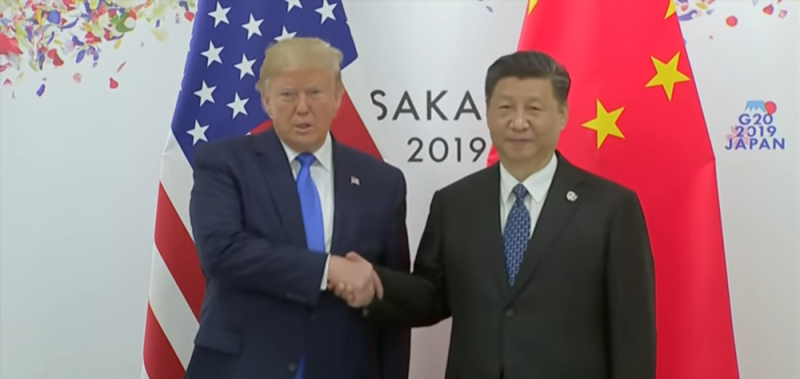1 October 2019 was the 70th anniversary of the foundation of the Peoples’ Republic of China.
China’s leader, Xi Jinping, used a military commemoration parade around Tiananmen Square in central Beijing to highlight the growth in influence and power of China over this time. This was the first big anniversary since China has emerged as a global power.
It has quickly become the world’s second-largest economy, almost eye-to-eye with the United States. But does this mean China and the U.S. will now become caught in a "Thucydides Trap"?
On 26 September 2019, the UN Secretary-General, António Guterres, remarked that:
“Every time I visit China, I am stunned by the speed of change and progress.”
On 1 October 1949, Chinese Communist Party leader Mao Zedong established the People’s Republic of China in Beijing after the peasant-backed Communists defeated the Nationalist Government of Chiang Kai-shek.
As a result, Chiang and thousands of his troops fled to Taiwan. The United States, which had backed the Nationalists against invading Japanese forces during World War II, supported Chiang’s exiled Republic of China Government in Taipei, setting the stage for several decades of limited U.S. relations with mainland China.
Since 1949, U.S.-China relations have evolved from tense standoffs to a complex mix of intensifying diplomacy, growing international rivalry and increasingly intertwined economies.
By 2019, a trade war has emerged and is escalating between China and the U.S., the continuing disputes over the Scarborough Shoal in the West Philippines Sea, the recent realignment of alliances of many South Pacific nations towards China and the continuing demonstrations in Hong Kong sparked by the proposed Hong Kong extradition Bill.
Over the last decade, the phrase "Thucydides Trap", has been popularised by Professor Graham Allison from Kennedy School of Government at Harvard. In 2017, he wrote Destined for War: Can America and China Escape Thucydides's Trap on the danger of conflict between the United States and China. In Destined for War, Allison explains why the "Thucydides Trap" is the best lens for understanding United States-China relations in the twenty-first century.
The ancient Greek historian Thucydides merits making the title of Graham Allison’s book. His analysis of the causes of the ancient war between the Athenians and the Spartans provides the essential dilemma of Destined for War: can states avoid catastrophic war when a rising power begins to challenge a dominant state’s control?
Thucydides’ pessimistic answer seemed to be “no”. He argued war was inevitable when the emerging power of Sparta contested Athens' supremacy 2,500 years ago. About the Peloponnesian War that devastated ancient Greece, Thucydides explained:
'What made war inevitable was the growth of Athenian power and the fear which this caused in Sparta.'
Professor Graham Allison has explored this statement as a general principle that recurs in similar situations: whenever a rising power confronts an established power, war is more likely than not.
This is "Thucydides Trap": a deadly pattern of structural stress that results when a rising power challenges a ruling one.
In Destined for War, Allison has identified sixteen historical examples over the past 500 years where the conditions have occurred, including the Napoleonic, Crimean and World Wars, in which the "Thucydides Trap" could be identified.
However, his primary focus is on current relations between the United States and China, offering his work as a warning against complacency. Allison offers only a slightly more optimistic take than Thucydides when he says war is more likely than not in analysing China’s growing challenge to America’s dominating position globally.
The account of the Peloponnesian War relies almost entirely on Thucydides. Thucydides was an Athenian, born in perhaps 460 BCE and was actually elected a General in 424 BCE during the first part of the War. Consequently, he took an active part for at least some of the time. However, following a military failure he was exiled for twenty years, which enabled him – as he says himself – to see 'what was being done on both sides, particularly on the Peloponnesian side'.
So Thucydides wrote as a military historian, not just as a bystander.
It is easy to regard the Peloponnesian War as a fight between two giants, Athens and Sparta, but in reality it was a war between two sets of allies – the Peloponnesian League, led by Sparta, and the Delian League, headed by Athens.
The Peloponnesian War pitted Athens, the dominant maritime power heading the Delian League, against Sparta, the dominant land power heading the Peloponnesian League. This was a great Hellenic Civil War that lasted intermittently for 27 years (431-404 BCE). Thucydides tells us that, at one time or another, the War involved the entire Greek world.
In the end, Athens, the world’s first great democracy, was defeated when it overstretched its military capabilities during the Sicilian Expedition. The catastrophic failure of the Sicilian Expedition helped reignite the war with Sparta.
The Peloponnesian War continued for nine more years and led to the ultimate defeat of Athens, the devastation of much of the Greek world, the weakening of Sparta and the reintroduction of intrusive Persian influence into Greek affairs. Athens paid the steepest price for its imperial overstretch but most of Greece suffered as well.
Today, an irresistible rising China is on course to collide with an immovable America. The likely result of this competition was identified by the ancient Greek historian Thucydides, over 2,500 years ago, when he wrote it was the rise of Athens and the fear that this instilled in Sparta that made war inevitable.
But the point of Professor Graham Allison’s Destined for War is not to predict the future but to prevent it. Can Washington and Beijing steer their ships of state through today’s treacherous shoals and escape "Thucydides Trap"?
Only if they learn and apply the lessons of history.
You can follow history editor Dr Glenn Davies on Twitter @DrGlennDavies.
 This work is licensed under a Creative Commons Attribution-NonCommercial-NoDerivs 3.0 Australia License
This work is licensed under a Creative Commons Attribution-NonCommercial-NoDerivs 3.0 Australia License
Support independent journalism Subscribe to IA.












